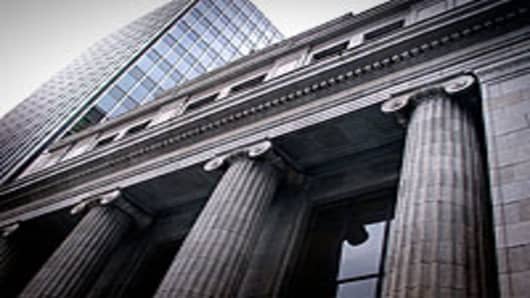Taking the handcuffs off the American banking system will do more to stimulate the economy than another round of money-printing, analyst Dick Bove said.
As the Federal Reserve contemplates a third round of quantitative easing to spur the slumping U.S. economy, Bove, the vice president for equity research at Rochdale Securities, asserted that removing capital and liquidity requirements for banks would get lending rolling again and stimulate activity.
"It seems clear that the United States economy’s growth is slowing and that the global economy is facing major challenges. This suggests a need for some action by the Federal Reserve and other central banks," Bove said in a note to clients. "It also appears to be just as evident that lowering interest rates to zero and printing more money are not effective options."
The Fed is winding down its most recent stimulus action, a $400 billion program nicknamed Operation Twist in which the central bank sells short-dated notes and buys an equal amount of longer-dated debt.
While the Fed is ostensibly a nonpolitical body, congressional leaders have expressed opposition to more balance sheet expansion and money-printing. Some on Wall Street, meanwhile, have begun to clamor for more easing.
Relaxing the bank regulations instituted after the financial crisis of 2008 would be a way to avoid the pitfalls of QE3.
The Dodd-Frank rules seek to make sure banks have enough cash on hand to buffet any dramatic losses such as those suffered when the subprime mortgage industry collapsed. That left banks with hundreds of billions of toxic assets on their balance sheets and necessitated a costly government bailout.
Jamie Dimon, CEO of JPMorgan Chase, which expanded during the crisis largely because of its strong capital position, has criticized portions of Dodd-Frank as regulatory overreach.
"It is possible that the regulators are beginning to understand that by taking the banks out of the financial system they are crippling the economy and pushing unemployment rates higher," said Bove, long a critic of increased bank regulation. "If they do understand this they might reverse the absurd actions they have taken and assist the economy."
As an example, Bove said rules that mandate a greater risk weighting of private loans than government loans make it harder for banks to meet capital requirements, and to supply money to the economy.
But bank lending has been improving lately.
Total loans increased $8 billion last week and are up 18 percent for the same period in 2011, according to financial services firm Keefe, Bruyette & Woods.
Commercial and industrial lending has been particularly strong in the second quarter, while consumer loans — primarily credit cards — have surged as well, while real estate loans are lagging.
Large domestic banks have been lending at a faster pace than smaller institutions, while foreign banks are seeing lending up 15 percent over 2011, with the gains concentrated in C&I loans.
On the other hand, some investors are bracing for difficult times ahead for regional banks, which are pressured in particular by the low-rate environment that the Fed has fostered since the 2008 financial crisis.
Credit Suisse recently warned of a likely 10 percent drop in the stocks of regional banks due to a likely lowering in earnings estimates
"There is more than enough money in the world to solve the financial issues that are in abundant evidence. The problem is that available funds are not being used," Bove said. "The money is not being used because the world’s central bankers have taken banks out of the financial system. Bank money is being used to pay government debt. Bank reserves must be reduced to stimulate economic growth."
Despite a monetary base that has grown 33.6 percent over the past four years, banks are parking most of their cash at the Federal Reserve because of the capital requirements, he said.
The blood-lust to kill banks and bankers in the United States is not killing the banks; it is killing the economy and preventing job creation," Bove said. "The government and the press must rethink what they are doing and commit themselves to economic growth and this means freeing the banks."




